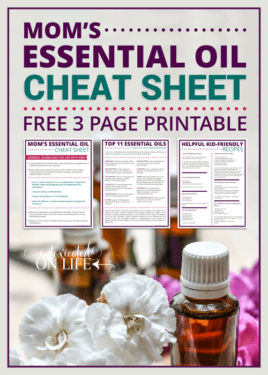When it came to prenatal practices, I used to always follow the doctor’s orders. However, after I did lots of research, I decided that there were 5 prenatal practices that I just did not feel comfortable doing anymore. Here’s why…
Hi, I’m Trisha, and I’m a first-born, ISTJ, rule-follower. I was that obedient child who did what I was told…and did what I was supposed to do even when I wasn’t told. I respect my authorities and do what they tell me.
Well, until now…
With my previous babies, I did what the doctors told me to do. Without question. If they made a recommendation or told me to get something done, I was there with bells on. But with this baby (baby #5 for us) there are 5 prenatal practices I’m refusing.
This isn’t easy for me. While I feel confident that I’ve read, researched, and prayed enough to make the right decisions for myself and my baby, telling my doctor “no” still makes me anxious when I think about it. I’m sure every time I say no my heart rate goes through the roof. But it’s more important to me that I’m advocating on behalf of myself and my baby than just go with the status quo this time around.
Before we get started, I want to let you know that this is not medical advice—I don’t even know you or your health situation so I can’t advise you. I’m not trying to recommend that you make the same choices I am. But you should know your prenatal practices options!
5 Prenatal Practices I’m Refusing
1. Unnecessary Pelvic Exams
I showed up at the doctor’s office for my 14-week appointment. After the obligatory pee-in-a-cup-check-my-weight-and-blood-pressure routine, the nurse asked me to get undressed and put on that ridiculous paper gown. I reminded her I wasn’t due for a pap for another 2 years.
Oh, she knew that. But then let me know it was just for a standard pelvic exam.
A standard pelvic exam at 14 weeks? I’d never had one of those with my prior babies. “For what?” I asked confused. I’d already had an intrauterine ultrasound and they knew my cervix was closed (something I don’t decline because of my history of preterm labor), so what could the purpose of poking around in there be.
She responded, “It’s just standard. They added it a while back.”
Well, it has been 6 years since I had my last babies, so some things certainly have changed.
I must have looked at her like she had an extra set of eyeballs because she tentatively added, “You can decline it if you want.”
And decline I did. Thankfully, the doctor didn’t say a word to me about it.
Typically doctors begin regular pelvic exams around 36 weeks. (I’ve never actually made it to 36 weeks pregnant, so haven’t had to deal with this question before.) The doctors are hoping they can keep this little munchkin in place for a few more weeks than I typically do, but we’ll see what happens.
So, why no regular pelvic exams as part of the prenatal practices? I mean, aside from just being uncomfortable and an undignified invasion of my body and all, there’s a few reasons.
- Introduction of bacteria – Yes, the doctor wears sterile gloves. But anytime you stick something up there, even if it’s supposed to be sterile, there’s a possibility that bacteria could be introduced. Beyond that, there is normal bacteria that is found in the vaginal canal. With a pelvic exam, this bacteria can get pushed further up towards the cervix.
- Stimulation of the cervix – As someone with a history of pre-term labor and having pre-term babies, I really don’t want to do anything that will stimulate my cervix.
- Accidental rupture of membranes – Again, not something I really want to risk even if it is a fairly low risk.
I’ll likely allow one pelvic exam when I get to the hospital and am in labor, but beyond that, I don’t plan to have any others (unless the doctor has a compelling reason, then I’ll reconsider). There really is no clear benefit to pelvic exams later in pregnancy and all throughout labor.
Yes, a pelvic exam can tell you have far you are dilated, effacement, and station of the baby. But constantly checking doesn’t do much good.
2. TDaP Vaccine
The TDaP vaccine (tetanus, diptheria, and pertussis) didn’t start getting pushed heavily on pregnant mamas in the US until after 2011. That’s when the CDC issued recommendations that pregnant moms begin getting this vaccination during the third trimester. My last babies were born in 2011, so it’s my first time having to decline this vaccine.
There’s two primary reasons I’ll be declining the TDaP vaccine as part of the prenatal practices. First (and most importantly) is because there haven’t been any long or short-term safety tests on mom or baby when giving this vaccine during pregnancy. In fact, this is what is on the vaccine insert…
Safety and effectiveness of this vaccine have not been established in pregnant women. Animal reproduction studies have not been conducted with this vaccine. It is also not known whether this vaccine can cause fetal harm when administered to a pregnant woman or can affect reproduction capacity. This vaccine should be given to a pregnant woman only if clearly needed.
Beyond there simply being no actual safety tests on humans, the TDaP vaccine is classified as a Class C drug. The definition of such a drug is:
Animal reproduction studies have shown an adverse effect on the fetus and there are no adequate and well-controlled studies in humans, but potential benefits may warrant use of the drug in pregnant women despite potential risks.
This isn’t a comprehensive post on the TDaP, so I won’t continue to get into all of the health concerns. But for me the potential risks don’t out-weight the potential benefits.
A second reason for me to skip this is because I have 2 MTHFR gene mutations. I know, that probably just looks like a string of gibberish letters, but it’s really a thing.
Those of us that have this particular gene mutation (around 40-60% of the population), it often causes trouble with eliminating toxins from our bodies.
Because of my MTHFR gene mutation and history of lyme disease, my general doctor has recommended that I do not get anymore vaccines—ever. I’m at a higher risk of having an adverse reaction vaccines and also a lyme relapse. No thanks, don’t want to go there.
3. Flu Vaccine
I’ve never had a flu vaccine in my life, and I’m certainly not about to start now while I’m pregnant as part of my prenatal practices actions.
While this vaccine is being heavily pushed on pregnant mamas, I have all of the same reservations about this vaccine as I do the TDaP vaccine. Beyond that, the influenza vaccine just doesn’t have a great track record. It’s not been proven to be that effective.
If you’re looking to boost your immune system naturally and avoid the flu without a shot during pregnancy (and beyond) there are a number of great strategies you can use, so you can avoid getting sick.
4. Traditional Gestational Diabetes Screening
The orange sugar drink. Mmmmm….yeah, not so much. I’ve drank it down and had it come back up more than once in my life. Which meant I had to make another appointment to try again. No more of that monkey business for me.
While it is very important to know if a new mama has gestational diabetes, drinking 50 grams of sugar drink is not the way I’ll opt to find this out. Aside from the high sugar content, the drink that’s typically offered contains brominated vegetable oil, food dyes, and other nasty ingredients I’d rather not put in my body.
Not only are the contents of the sugar-drink used for gestational diabetes screening less than optimal, but there’s a high rate of false positives. Approximately 15-20% of pregnant women will test positive on this test, but when given the follow-up confirmation test only 2-5% of women will test positive.
Instead of the traditional gestational diabetes screening for part of my prenatal practices, I’ll be telling my doctor I’d like to monitor my blood sugar over the course of a couple of weeks. All it takes are a few little finger pricks throughout the days that I’m testing. It doesn’t involve eating or drinking anything crazy or out of the ordinary.
That’s the beauty of this test. My doctor and I will be able to see what my blood sugar levels are doing in response to the normal foods I eat every day. And it will give a more extensive view of what’s happening in my body—not just a snapshot of what happened during a one hour window in response to something I’d never ordinarily drink anyhow.
5. Screening for Birth Defects
There are a number of optional screenings for birth defects that are currently offered, that my doctor strongly recommended to me this time around for part of my prenatal practices because of my *ahem* advanced maternal age.
While we do have the 20- week anomaly ultrasound, the other optional screenings we decline. This ultrasound is much more than just finding out the gender of your little munchkin. It can help detect some serious birth defects that may need to be treated right after birth or sometimes in utero.
We choose not to do some tests because they have a very high rate of false positives. I do understand for some families, it may help them mentally prepare, but for us it would could cause a lot of stress if one were to come back positive. We will deal with the problems if they arise. Other tests, like CVS (chorionic villus sampling) and amniocentesis can increase your risk of miscarriage.
Prenatal Practices and Your Rights…
It’s easy to just say “yes” to whatever your doctor recommends (that’s pretty much what I did for my first two pregnancies) for prenatal practices.
After all, we’ve been programmed to see them as the authority when it comes to our health. While they certainly have lots of information packed into their heads and I certainly want them on my side if anything goes wrong, it’s important to remember they’re not the ultimate authority.
When you spend time researching and understanding both sides of an argument, you’re taking responsibility for your health and the health of your baby.
Some doctors and healthcare providers can try to “bully” you into procedures more than others. Despite what they say, you do have the right to decline treatment and/or tests. Look for a healthcare provider that sees themselves as a member of your healthcare team. You want someone who is going to work towards your health goals—someone who will truly listen to you and respect your decisions.
What about after baby is born? Learn about health decisions I’m making differently for baby before he even leaves the hospital!
More Healthy Motherhood Articles:
- Breastfeeding During Pregnancy
- 3 Surprising Tips About How to Prepare to Breastfeed
- Mom’s Guide to Choosing the Best Baby Ointment
- Mom in the Trenches: 10 Scriptures to Encourage You













I think you mean “20-week anatomy scan” in section 5.
Yes! Thank you for catching that typo. Added the ‘0’ and we’re all good now 🙂
I’ve never been offered the TDap during pregnancy. They usually ask after delivery. I had one in 2009 after my first and have declined it after my other 3 because tetanus is a 10 yr vaccine. I don’t need more of that just because I had another kid.
This is also my 5th and I started declining other things with my 3rd and 4th. My doc was super awesome letting me do my blood sugar at home for a week instead of the orange drink for my 4th. Alas, she is gone and my new doc for baby 5 didn’t really give me that option even though I asked. I told her I didn’t want the orange drink and she said I could do a pack of skittles instead. I said that’d be fine since a pack of skittles is much more likely than that other junk!
I did start declining the pelvic exams during my third pregnancy and didn’t have any during my 4th. I’ll likely wait until 40 weeks for an exam this time since this doc has given me till 41 weeks. My 4th didn’t come till 41 weeks so there’s a decent enough chance that this one might cook a while too.
The vaccine is recommended during the last trimester so that the mother will pass antibodies (mainly for pertussis, not tetanus) to the baby. Your child doesn’t get the same protection otherwise, which depending on your circumstances may not be a big deal. It just helps protect baby until they have a stronger immune system or are of age to get the vaccine.
This is true, they want you to get the tdap during pregnancy to pass it on to baby. But whether or not this vaccine is effective in this way and is worth the potential risks is another question altogether. In the US there are currently aprox. 4 babies per 4 million born that die from a pertussis infection. If that’s your baby, it would of course be heartbreaking. But it’s literally a 1 in a million chance…you’re more likely to be hit by lightening twice than your baby die from pertussis if you live in the US! And it’s worth considering the risks from the toxicity of the vaccine to both mom and baby. And there is a lot of evidence suggesting that using the vaccine during pregnancy really doesn’t help pass the antibodies on to baby as we’ve been led to believe. I do believe a whole post could be written about this topic and the researhc on it!
Thank you so much for your awesome informative information. As a young mother i needed more insight to make a proper decision for the health of my child and myself.
I also said no to these with baby #4. I’m now pregnant with #5 and totally left the dr/hospital scene and have a midwife and will be delivering at home. Best decision I’ve made! I pray your little one stays healthy and way past 36 weeks 🙂
That’s great to hear you’re happy with your midwife! I checked into this option, even looking at a midwife who works with a doctor and delivers in a hospital but unfortunately they consider me too high risk and won’t take me on as a patient. So far, the doctor I’ve been using has been very respectful of my opinions and I’ve hired a doula to work with us this time around too. Praying your pregnancy continues to go well too! 🙂
In reference to #1, our state requires a mandatory test for certain communicable diseases. Diseases that I am NOT at risk for. My doc performed this test without my consent because of state law. Guess who was billed for it? I found the test incredibly invasive and offensive – and the bill even more so. So, you’re very right to refuse this exam if you don’t want or need it. (our state requires health care providers to do the test, but does not require me to submit to it. I don’t know what they do if I persistently refuse except sneak it in to keep their license?) I’m stunned that women keep putting up with this test.
Sorry to hear you were tested without consent. That’s not cool. I’d definitely be looking for a new doctor who would take you seriously and abide by your wishes! Don’t forget, they work for you.
I’m a nursing school student and five months pregnant. In order for me to do clinical they’re telling me I have to have the flu shot and tdap. I told them I didn’t feel comfortable until after I delivered and they said that I couldn’t do my clinical until I got the shots. I dont know what to do.
Honestly we need more information like this! This has helped me stand on my decision to not get the Tdap vaccine. I had no clue about the gestational diabetes test. But will definitely keep this in mind for my next child.
I’m wondering you’d graciously share some resources for the TDAP vaccine. With the CDC claiming every new vaccine is safe for pregnant women and also the TDAP vaccine being a new thing during pregnancy, my gut instinct is no. I’ve been told to do my research but only come upon everyone lauding it. I’ll be giving birth in Mexico with a midwife and cocooning for 2 months but wanted to know more. I’m also thinking of getting the vaccine after delivery, but not sure how good that will been be for the baby. Thank you so much 🙏🙏🙏
For those reading this in 2021…if pregnant women do choose to get TDap I’ve learned to ask for Boostrix. Boostrix is considered Category B, whereas Adacel is considered Category C. Category B vaccines have failed to demonstrate a risk to the fetus, whereas category C vaccines have shown a adverse effects on the fetus. These categories are based on animal studies as there have been no well-controlled studies done in pregnant women.
When I went to my MD office, they had no idea the differences between these brands for pregnant women and tried to assure me either would be fine because they only had Adacel in stock. I politely declined.
I AGREE WITH EVERY PART OF THIS! My doctor is pushing me to have the TDAP and NO is always the answer. Crazy part is they try and make you feel as if your a bad parent if you don’t . As if putting something thing made in a lab in my body would make me a good one ! I needed this ! Thank you!